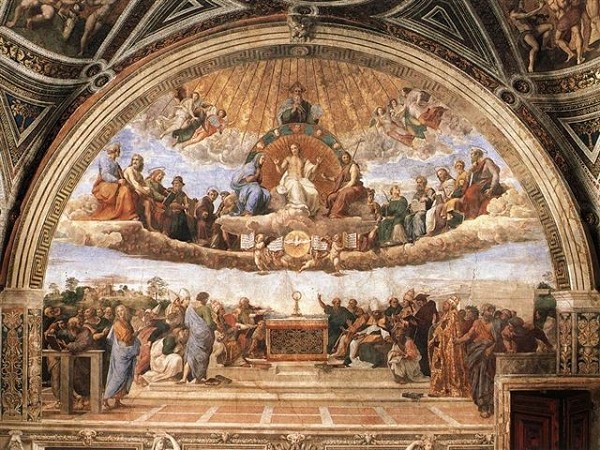In the Eucharistic liturgy, the present moment is drawn up into eternity. Through the presence of the Risen Lord made tangible under the appearance of bread and wine, the infinite distance between God and creation is bridged. In this moment of communion, all of creation is brought into the transfiguring light of God’s glory and humanity finally experiences the purpose, direction, and orientation of her longings and her constant activity. It is in the Eucharistic encounter that our Lord answers the fundamental questions of human existence, all through the gift of his grace.
In this way, we exist not so much to execute a series of noble actions nor do we exist for the sake of self-improvement. Our earthly existence is one continuous drama of conversion whereby we either learn to open our hearts in complete surrender to God’s invitation or we enclose ourselves in prisons of egocentricity and self-reliance. The pathway of damnation is not an arbitrary punishment imposed on us by God, but a turning in ourselves where we close ourselves off from the working of the Holy Spirit.
Thus, the trajectory of our growth is precisely in our ability to enter into the Eucharistic encounter. The Eucharist is the center of all reality precisely because it is the means by which the believer discovers his or her’s new life in Christ. Our ability to become agents of transformation in the world begins with our worthy reception of Holy Communion. Our reception is built upon a deep pondering of the Word of God, and so it involves a habit of remembering the things of God. Along these lines, the manner in which we approach the Eucharistic banquet is not simply an exercise in piety, but rather the fundamental attitude of our entire existence.
That is why St. John Paul II called the Eucharist the source and summit of the Catholic faith. In the Eucharist, we come to a deeper knowledge of God. This knowledge is not based on information or our ability to memorize tidbits of trivia, but rather is the experiential knowledge which is the fruit of a personal relationship with the Father made possible through the Son. In Christ, we come into contact with the Divine and so interiorize eternity. This in turn leads us to fruitful activity which is based on our cooperation with the activity of God.
Thus we must run to the Eucharist with complete abandonment. We must seek our Eucharistic Lord with zeal and complete surrender, confident that in this exchange between heaven and earth, we discover our true identity and vocation in Christ. Let us celebrate the Mass with devotion and so plunge into the boundless ocean of Christ’s love with joy and trust.











What beautiful words to describe how we should allow our soul complete freedom to joyfully climb the heavenly heights to adore her creator. The fact that the words were written by a holy priest who has just been ordained and fairly bursting with the pure love of one who has now experienced Christ working in and through him at the miracle of the Most Holy Mass, makes the words even more profound. Thank you!
You write so lyrically of this most beautiful sacrament. Thank you, Father Ian.